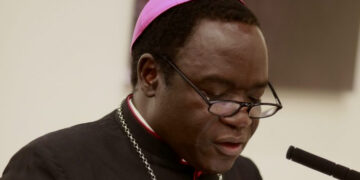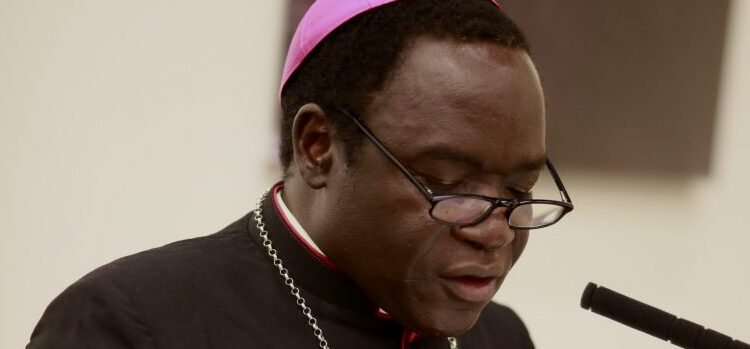By Mahmud Jega
When I saw media images of Bishop Mathew Hassan Kukah of the Catholic Church’s Sokoto Diocese struggling to explain what he said or did not say in his controversial Christmas Day message, I thought he was paying a price for not heeding the advice of the 30th President of the United States, Calvin C. Coolidge. As US Vice President in 1921-23 and as President in 1923-29, Coolidge said so little in public and in private that his countrymen called him “Silent Cal.” Nearly 100 years ago, when he saw a man struggling to explain the meaning of what he earlier said, Coolidge said, “If you do not say something, you won’t be called upon to explain it.”
A bishop has to say something on Christmas Day, but he had options before him on what to say and how to say it. He could speak within the confines of his church, but Bishop Kukah is too used to the public stage to contemplate such restriction. He could have delivered his homily in Latin, so that only a few people in Nigeria could hear it. Or he could have devoted his message entirely to how people could enter paradise, the main reason why people still listen to clerics because we think they have a gate pass.
With two notable exceptions, the Catholic Church in Nigeria is free of controversy, having ceded controversial comments to leaders of Pentecostal churches. The most recent controversial Catholic priest is Reverend Father Mbaka of Enugu. Before him, Archbishop Olubunmi Okogie of Lagos was once very controversial. During the 1979 elections, Okogie publicly lampooned UPN presidential candidate Chief Obafemi Awolowo. The reason, according to some newspapers at the time, was that Okogie got a hint that Awo planned to appoint Tai Solarin as Minister of Education. Tai not only supported government takeover of mission schools, but he was also opposed to religious education. Okogie’s attacks rankled Awo so much that in his marathon speech to the UPN convention in November 1979, he devoted 16 pages to Okogie, replete with biblical quotations. I expected President Buhari to borrow a leaf and devote ten pages of his New Year’s address to Kukah.
Bishop Kukah, who probably counts me as one of his friends and intellectual sparring partners, is fast becoming the Counterfeit Sin. Let me clarify that before I also get enmeshed in controversy. He is becoming the Nigerian version of Jaime Cardinal Sin, outspoken Roman Catholic Archbishop of Manila at the height of Ferdinand Marcos’ dictatorship in the Philippines. The Archbishop declared himself to be “the Original Sin.” He regularly lampooned Marcos and his wife Imelda from the pulpit. He once said, “There is a mining industry in the Philippines. This is mine, this is mine, this is mine.” After the Iranian revolution of 1979, President Marcos told reporters that “Sin is trying to be a Khomeini.” Reporters rushed from the Malacanang Palace to the Cathedral and reported the news to Sin. Who promptly said, “If there is a Khomeini in the Philippines, then there must be a Shah!”
With no vacancy for an Original Sin, our Bishop Kukah can only be a counterfeit sin. Unlike the original one, Kukah’s Christmas Day message had almost no humour, which could have softened the blow he delivered. In the 1980s when Liberation Theology swept through the Church in Latin America where dictatorship was the order of the day, then Father Kukah wrote sympathetic articles in his Mustard Seed column in New Nigerian. Liberation theology was a dangerous art; goons of the far-right Salvadoran politician Roberto “Major Bob” D’Aubuisson assassinated its chief proponent, Archbishop of San Salvador Oscar Romero. His successor, Archbishop Arturo Rivera Damas, also received many death threats. By recalling Romero’s 1980 assassination, I am not calling for one in Nigeria. After all, Kukah himself said that just because he mentioned coup in his Christmas message did not mean he was calling for one.
Nigeria is a dangerous place right now, but not from state-sponsored agents. As far as I can see, neither the North Eastern insurgents nor the North Western bandits are sponsored by the state, even if it has incompetently fought them. Logic suggests they are not state-sponsored because the two groups’ actions were collectively responsible for the severe erosion of Buhari’s once unassailable political standing with the Northern masses. Yet, Bishop Kukah alleged possible collusion between the two when he said, “The spilling of this blood must be related to a more sinister plot that is beyond our comprehension. Are we going to remain hogtied by these evil men or are they gradually becoming part of a larger plot to seal the fate of our country?”
Southern Nigerian politicians know very well that the Northern elite is averse to a split of Nigeria, probably because the North lacks sea coast and oil. The latter is a temporary problem but the former is a permanent problem. This is why Southern politicians and activists frequently call for a sovereign national conference, with the hint of a break up, or a modified form of it, calls for implementation of the 2014 national conference report, as Chief Bode George recently did. Although Bishop Kukah was secretary of the 2004 political conference, he is not pushing a similar agenda because the Middle Belt faces the same dilemma as the North with respect to the possible break up of Nigeria, perhaps worse.
Kukah’s Christmas message varied substantially in tone and substance from that of Pope Francis, Supreme Pontiff of the Roman Catholic Church, Bishop of Rome and Vicar of Jesus Christ. The Pope’s Christmas message “To the City of Rome and the World”, delivered from the Hall of Benediction of St Peter’s Basilica, as reported by Vatican News, “offered words of hope and consolation.” “Thanks to the Christ Child, we can all call one another brothers and sisters even as we hail from every continent, every language and culture, with our own identities and differences.” The Pope “offered his prayers and encouraged all people to offer theirs to remember the many children worldwide who are victims of war, especially in Syria, Iraq and Yemen;” incidentally, all three are Muslim-majority countries. He did not dwell of Christian community grievances in Syria and Iraq or allege Muslim hegemony.
The Pope also “prayed that peace may take root in Libya and that Israelis and Palestinians might regain mutual trust to continue dialogue to overcome grievances… He encouraged the Lebanese to keep hope alive…” and he prayed for an end to suffering in “Burkina Faso, Mali, Niger, Ethiopia, Mozambique, South Sudan, Nigeria and Cameroon,” many of them Muslim-majority countries. Pope Francis then remembered victims of natural disasters in the Philippines and Vietnam and he “noted the suffering of the Rohingya people and that they might find respite and hope.” Incidentally, the Rohingyas are Muslims. Bishop Kukah did not pray for an end to suffering in Borno IDP camps, Katsina, Zamfara, Taraba, Benue or even Southern Kaduna State.
It was not the first time that I noticed a discrepancy between Bishop Kukah’s beliefs and those of the Church leadership. In 2016, I received a call from Bishop Kukah, who expressed to me the belief that then Emir of Kano Muhammadu Sanusi II’s controversial comment about the North practising 13th century Islam was being reformist. I gently reminded him that not all social institutions are about reform. On the night that the College of Cardinals elected Pope Francis in 2013, CNN’s reporter Christiane Amanpour asked Timothy Cardinal Dolan, Archbishop of New York, what reforms the new Pope will bring forth. Dolan said, “Unlike presidents and corporate leaders, I don’t think he sees his mission as being to reform. He sees his mission as being to conserve the gospel of Jesus Christ. He may tinker with the way the message is delivered, but not with the message itself.”
Maybe that was why Calvin Coolidge once said, “I have never been hurt by what I have not said.”
This column by Mahmud Jega was published by Daily Trust on January 4, 2021.


































